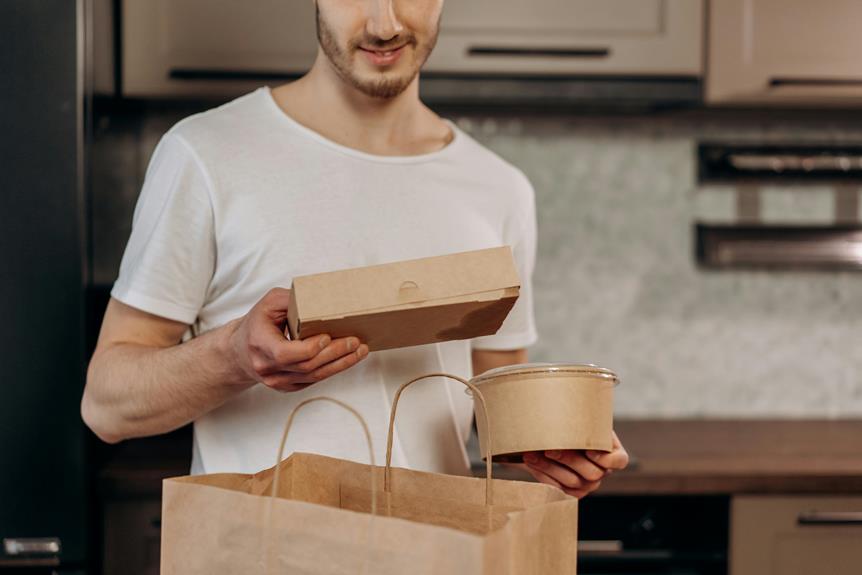When it comes to reducing single-use plastic waste and embracing eco-friendly alternatives, biodegradable takeaway containers stand out as a promising solution. These innovative containers offer a sustainable approach to packaging that aligns with environmental goals and consumer preferences. With their ability to break down naturally and minimize harm to the planet, biodegradable options present a compelling case for businesses and individuals looking to make a positive impact. But what makes these containers truly effective in addressing sustainability challenges? Stay tuned to discover more about the benefits and potential of biodegradable takeaway packaging.
Environmental Impact of Plastic Containers
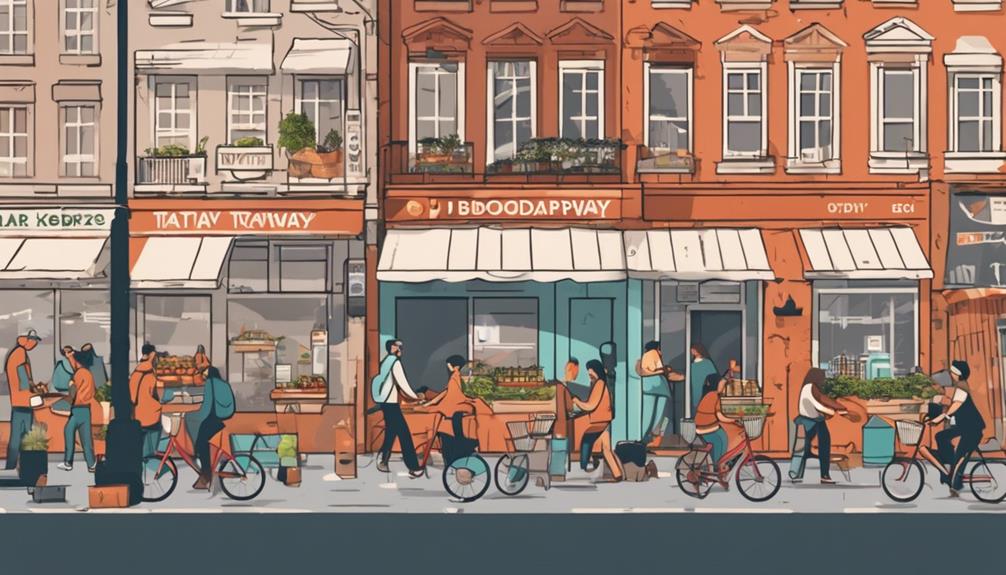
Plastic containers have a significant environmental impact due to their non-biodegradable nature. When these containers are disposed of improperly, they contribute to pollution and harm ecosystems.
Recycling programs play an important role in mitigating this impact by diverting plastic waste from landfills and reducing the need for virgin plastic production. However, consumer behavior also plays a key role in addressing this issue. By adopting eco-friendly practices such as opting for reusable containers or choosing products with minimal packaging, individuals can contribute to waste reduction and lessen the demand for plastic containers.
It is essential for consumers to be mindful of the environmental consequences of their choices. Simple actions like properly sorting recyclables and supporting businesses that prioritize sustainability can make a significant difference.
Advantages of Biodegradable Alternatives
When considering sustainable packaging options, biodegradable alternatives offer numerous advantages over traditional plastic containers. Consumer awareness about the harmful effects of plastic on the environment has been increasing, leading to a shift in consumer preferences towards eco-friendly options. As a result, there's a growing market demand for biodegradable takeaway containers.
One of the key advantages of biodegradable alternatives is their reduced impact on the environment. Unlike traditional plastic containers that can take hundreds of years to decompose, biodegradable options break down much faster, reducing landfill waste and pollution. Additionally, biodegradable materials are often made from renewable resources like cornstarch or sugarcane, further decreasing their environmental footprint.
Moreover, biodegradable takeaway containers are non-toxic and don't release harmful chemicals when they break down, making them safer for both the environment and human health. By choosing biodegradable alternatives, you can contribute to a more sustainable future while meeting the increasing consumer demand for eco-friendly packaging solutions.
Types of Biodegradable Takeaway Packaging
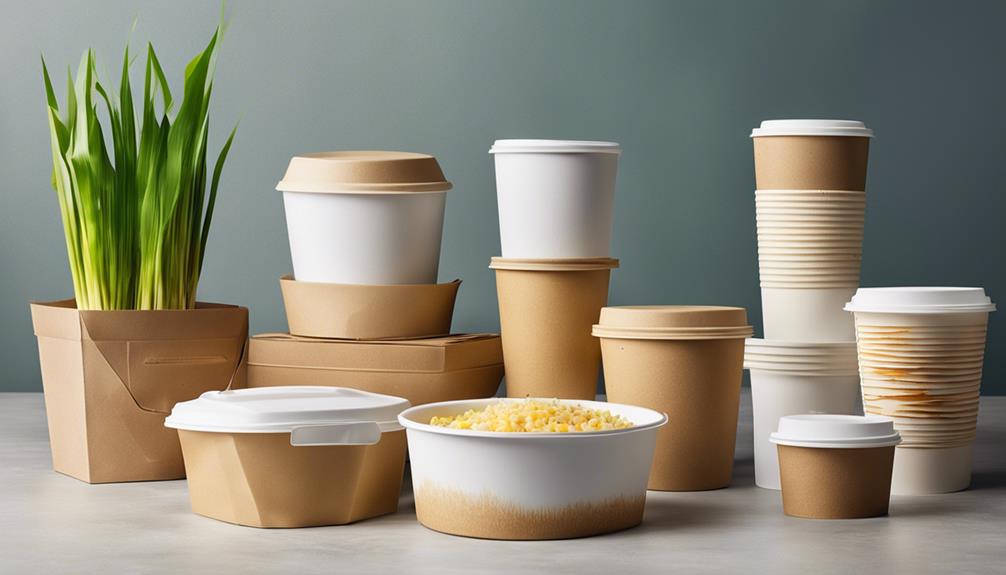
Consider the diverse range of biodegradable takeaway packaging options available in the market today. When selecting biodegradable containers for your business, it is vital to explore the various material options and customization features to suit your specific needs. These containers come in different shapes, sizes, and materials, allowing you to find the perfect fit for your products. Additionally, the durability and insulation properties of these eco-friendly containers play an important role in maintaining the quality of your food during transportation.
| Material Options | Customization Features | Durability |
|---|---|---|
| Sugarcane Fiber | Logo Printing | Sturdy |
| PLA (Polylactic Acid) | Different Colors | Resistant to Leaks |
| Palm Leaf | Custom Shapes | Strong |
| Recycled Cardboard | Branding Options | Insulating |
Composting Benefits of Biodegradable Containers
Explore the composting benefits of biodegradable containers, emphasizing their eco-friendly disposal and contribution to sustainable waste management practices.
Biodegradable containers play an essential role in the composting process, providing eco-friendly benefits that aid in soil enrichment and waste reduction.
When biodegradable containers are composted, they break down naturally into organic matter, enriching the soil with essential nutrients. This soil enrichment boosts plant growth and overall soil health, promoting a sustainable ecosystem.
Additionally, the composting process helps reduce the amount of waste sent to landfills, decreasing environmental impact and conserving valuable landfill space.
Regulations and Certifications for Biodegradability
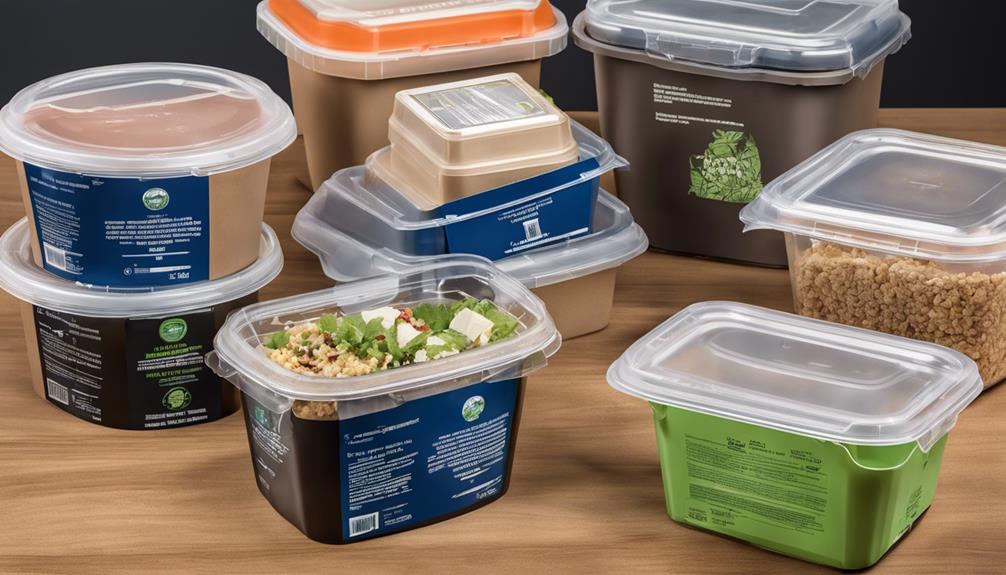
To guarantee the eco-friendly disposal and credibility of biodegradable containers, understanding regulations and certifications for biodegradability is essential. Certification standards and industry regulations play an important role in making sure that biodegradable containers meet specific criteria for compostability and environmental impact. Here is a breakdown of some key certification standards commonly seen in the industry:
| Certification Standard | Description | Recognized By |
|---|---|---|
| BPI Compostable | Ensures products compost effectively in municipal and industrial facilities | Biodegradable Products Institute |
| ASTM D6400 | Specifies requirements for compostable plastics | American Society for Testing and Materials |
| EU Ecolabel | Indicates products meet environmental criteria | European Union |
Cost Considerations for Businesses
When evaluating biodegradable takeaway containers for your business, it's important to factor in cost considerations to make informed decisions. Conducting a cost analysis is vital to determine the financial implications of switching to sustainable packaging. While eco-friendly alternatives may initially seem more expensive, long-term savings can be achieved through budget planning and reduced waste management costs.
While comparing the cost of biodegradable containers to traditional options, remember to take into account the overall sustainability benefits. Investing in biodegradable containers aligns with eco-conscious consumer preferences and can enhance your brand image. Additionally, some suppliers offer bulk discounts or incentives for businesses adopting sustainable practices, aiding in cost-effectiveness.
Budget planning is key to integrating biodegradable takeaway containers seamlessly. Evaluate your current expenses on conventional packaging and assess how incorporating sustainable options fits within your financial framework. By strategically allocating resources and exploring available subsidies or grants for sustainability initiatives, you can make environmentally responsible choices without compromising your budget.
Prioritizing sustainability in your cost analysis not only benefits the environment but also positions your business as a socially responsible leader in the industry.
Tips for Proper Disposal and Recycling
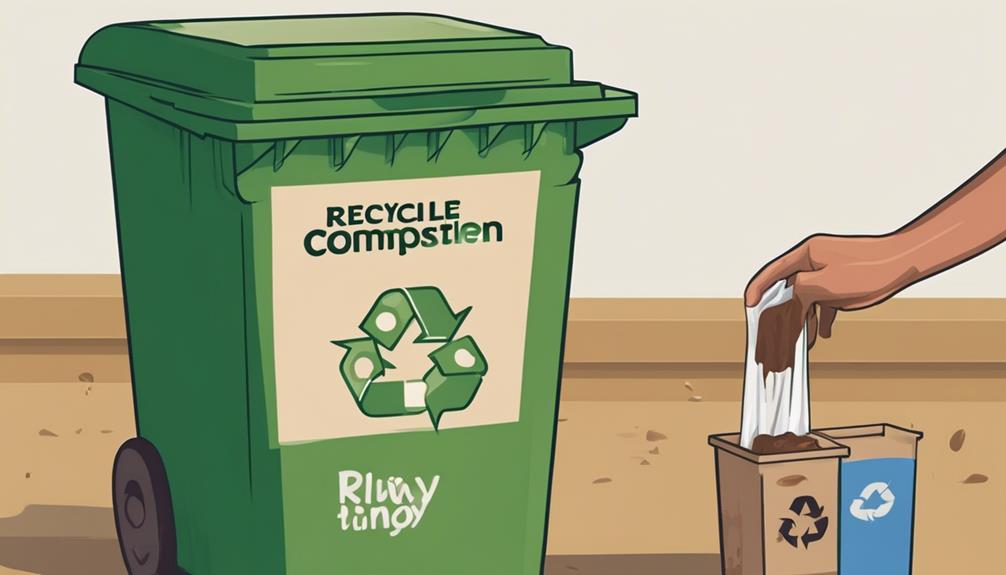
Consider incorporating proper disposal and recycling practices to maximize the environmental benefits of using biodegradable takeaway containers. When it comes to waste management, make sure to separate biodegradable containers from regular waste to guarantee they end up in the right facilities.
Many biodegradable takeaway containers are compostable, so explore composting options in your area. By composting these containers, you can help reduce the amount of waste sent to landfills and contribute to the creation of nutrient-rich soil.
Recycling options for biodegradable takeaway containers may vary depending on the type of material they're made of. Some containers can be recycled alongside traditional recyclables, while others may require specialized recycling facilities. Check with your local recycling center or waste management company to determine the best recycling options for your specific containers.
Properly recycling these containers ensures that they can be repurposed into new products, reducing the demand for virgin materials and lowering overall environmental impact. By following these waste management and recycling practices, you can make a positive impact on the environment while enjoying the convenience of biodegradable takeaway containers.
Future Trends in Sustainable Packaging
Explore upcoming innovations in sustainable packaging to stay ahead of the curve and reduce your environmental footprint.
The future of sustainable packaging is bright, with a focus on eco-friendly materials and sustainable solutions. Companies are increasingly turning to biodegradable alternatives such as compostable plastics made from plant-based sources like corn or sugarcane. These materials break down naturally, reducing the impact on landfills and oceans.
Another trend shaping the future of sustainable packaging is the use of recycled materials. By repurposing materials like paper, cardboard, or glass, companies can minimize waste and lower their carbon footprint.
Additionally, advancements in technology are leading to the development of innovative packaging solutions, such as edible packaging made from seaweed or beeswax wraps that are reusable and biodegradable.
Embracing these future trends in sustainable packaging not only benefits the environment but also enhances your brand's reputation as a responsible and eco-conscious entity. By adopting eco-friendly materials and sustainable solutions, you can contribute to a greener future for generations to come.
Conclusion
Choose biodegradable takeaway containers for a greener future. Reduce plastic waste, support sustainable practices, and protect the environment.
Make a positive impact on the planet by opting for eco-friendly packaging options. Together, we can make a difference for future generations.
Go green with biodegradable containers today!
